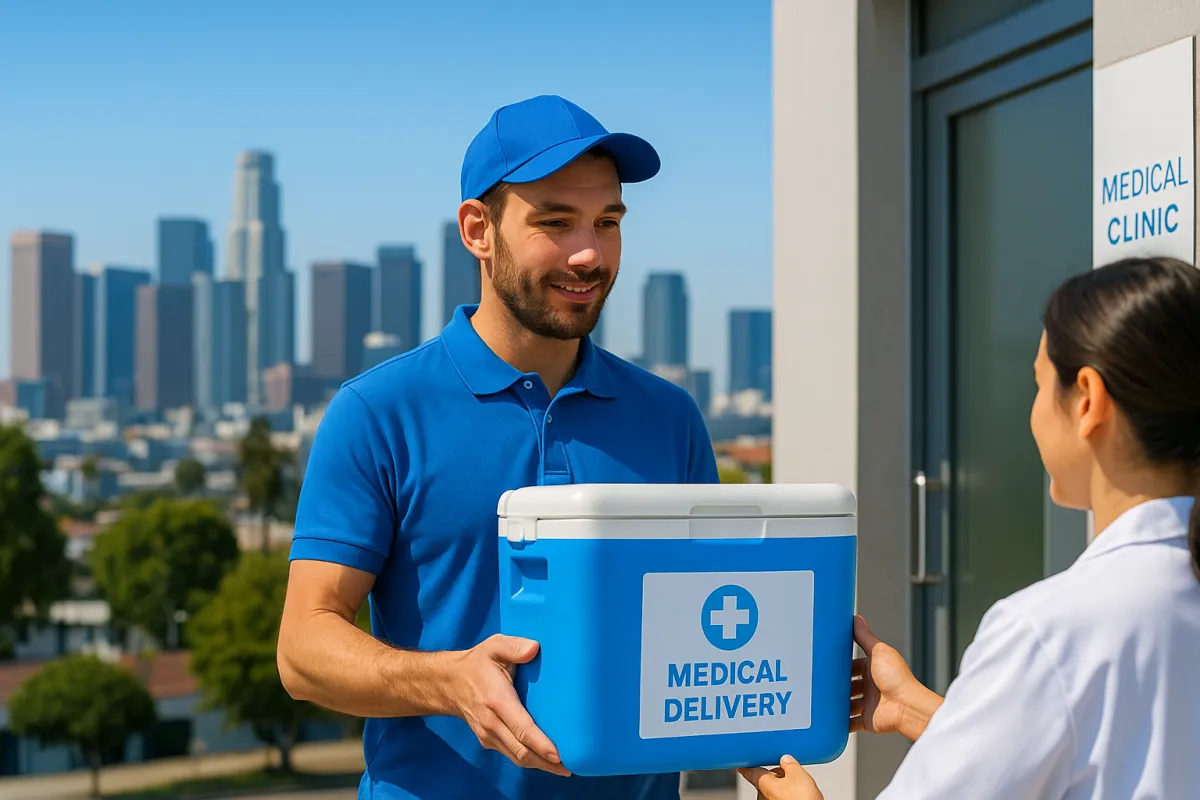
Same-Day Medical Courier in Los Angeles: What Pharmacies Should Expect

Running a pharmacy in Los Angeles means juggling high order volumes, tight delivery windows, and strict compliance requirements. When you need a same-day medical courier in LA, you’re not just hiring a driver — you’re choosing a logistics partner who protects temperature integrity, HIPAA compliance, and your reputation with patients and prescribers. This guide breaks down the standards LA pharmacies should expect (and demand) from a courier partner.
Why Los Angeles pharmacies have unique courier needs
High density + traffic: LA’s congestion and spread-out neighborhoods make ETAs unpredictable without real-time routing.
Regulatory pressure: HIPAA, chain of custody, and cold-chain documentation are table stakes.
Peak-time variability: Evenings, weekends, and holidays still require STAT coverage and first-attempt delivery success.
1) Service Levels & ETAs: What “Same-Day” Really Means in LA
Not all “same-day” services are equal. Here’s how a professional courier should scope ETAs across LA:
Core LA Basin (Downtown, Koreatown, Hollywood, Mid-City, East LA): 1–3 hours for on-demand, tighter windows for scheduled routes.
Westside (Santa Monica, Westwood, Culver City): 2–4 hours depending on rush hour and beach traffic.
San Fernando Valley (Van Nuys, Burbank, Encino): 2–4 hours with alternate canyon routes during peak times.
South Bay (Torrance, Long Beach): 2–4 hours; port activity can affect timing.
San Gabriel Valley (Pasadena, Arcadia): 2–4 hours; event days require buffers.
What to expect from us:
Smart dispatch that accounts for day-part traffic patterns.
Live tracking + proof of delivery (name, timestamp, geostamp, signature where appropriate).
Proactive exception notifications (e.g., closed office, incorrect address, patient unreachable).
Tip: For recurring lane deliveries, build a scheduled route. You’ll get tighter ETAs, better rates, and higher first-attempt success.
2) HIPAA & Chain of Custody: Non-Negotiables
Every handoff in your delivery flow should preserve patient privacy and product integrity.
Your courier should provide:
Driver training on PHI handling and in-vehicle privacy.
Sealed containers and tamper-evident measures for sensitive items.
Documented chain of custody — who received what, when, and where.
Clean, organized vehicles; no mixing with non-compliant cargo.
What to log:
Sender, recipient, item type (no sensitive details in plain text), pickup/drop timestamps, exceptions, and corrective actions.]

3) Cold Chain & Temperature Control: Zero-Excursion Playbook
For insulin, biologics, vaccines, and other temperature-sensitive medications, zero excursions is the goal.
Expect these controls:
Pre-conditioned gel packs and insulated containers sized to the payload.
Data logging (where required) and verification upon delivery.
Standard operating procedures (SOPs) for pack-outs and dwell time.
Fast door-to-door cycles to avoid thermal drift.
When to ask for a temp-validated run:
Long distances in afternoon heat.
Multi-stop routes with risk of extended dwell time.
High-value products with strict stability profiles.
4) First-Attempt Delivery Success: The Pharmacy KPI That Matters
A cheaper courier isn’t cheaper if they miss the first attempt.
What drives first-attempt success in LA:
Accurate recipient instructions (suite number, gate codes, parking notes).
Pre-call or SMS heads-up for patient deliveries.
Address validation and geocoding at dispatch.
Flexible re-attempt policy with documented reason codes.
Our standard: we target high on-time percentage (OT%) and >95% first-attempt success on scheduled lanes — and we show the data.
5) Pricing in Los Angeles: What Actually Affects Your Rate
Transparent pricing helps you compare apples to apples.
Inputs that typically determine rate:
Distance + zone (LA Basin vs Valley vs South Bay).
Service speed (STAT, 2-hour, same-day, scheduled).
Wait time/load time and special handling (signature, ID check).
Cold chain materials and device usage where applicable.
Stop density on routes (more stops per mile = lower cost per stop).
Pro tip: Move recurring deliveries to a scheduled route with consistent pickup windows — it usually lowers your effective cost per stop.
6) What a Professional LA Courier Tech Stack Looks Like
Live tracking & POD embedded in the dispatch platform.
Route optimization that learns from historical LA traffic patterns.
Exception workflows (closed offices, patient not home) with fast re-routes.
Secure recordkeeping for HIPAA and chain-of-custody audits.
7) How to Choose Your LA Medical Courier: 10 Quick Questions
What are typical ETAs by neighborhood and day-part?
How do you handle HIPAA and PHI in the field?
Describe your chain-of-custody process.
Do you offer validated cold-chain runs?
What’s your first-attempt success rate?
What’s your on-time percentage for scheduled routes?
How do you manage exceptions and re-attempts?
Can we get delivery photos, signatures, and geostamps?
Do you provide billing that maps to lanes/stops clearly?
Can you support evenings, weekends, and holidays?

FAQ (for readers)
Do you offer after-hours or weekend deliveries?
Yes—including holidays. We’ll define cut-off times and surge coverage ahead of time. See Service Availability.
Can patients receive home deliveries?
Yes. We offer discreet, signature-optional handoffs based on your policy. See Home Delivery for Pharmacies.
Can you carry refrigerated medications?
Yes. We provide insulated containers and pack-outs sized to the load, with data logging on request. Read Temperature-Controlled Courier.